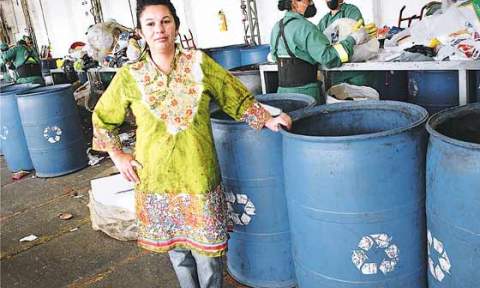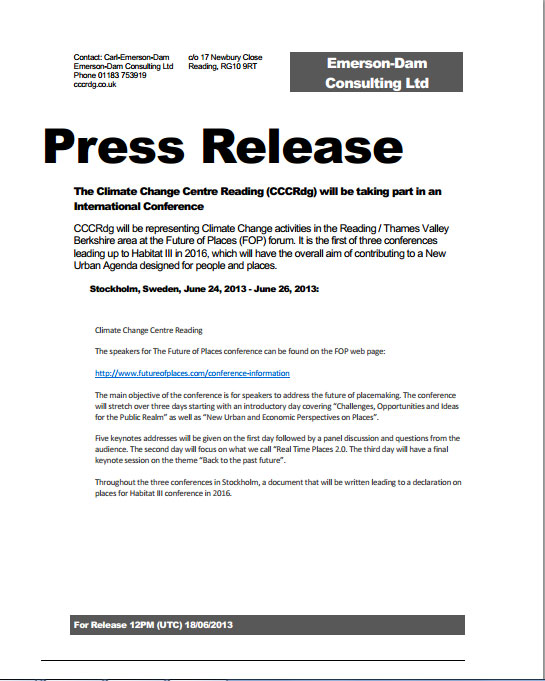A World Without Landfills? It’s Closer than You Think | Nation of Change

There is a growing global movement to significantly reduce the amount of trash we produce as communities, cities, countries and even regions. It’s called the zero-waste movement, and it received a major boost this week as two of its leaders were awarded the prestigious Goldman Environmental Prize.
Nohra Padilla and Rossano Ercolini are two of the winners of this year’s Goldman Prize, which awards $150,000 to each of six grassroots environmentalists who have achieved great impact, often against great odds. On the surface, Padilla and Ercolini seem to have little in common. Padilla is a grassroots recycler—also known as a waste picker—from the embattled city of Bogotá, Colombia. Ercolini is an elementary school teacher from the rustic farmlands of Capannori, Italy.
Though their experiences are different, they share a common cause: organizing to reduce the amount of trash—everything from cans and bottles to cell phones and apple cores—that ends up buried in landfills or burned in incinerators.
What is zero waste?
Here in the United States zero waste is often thought of as a lifestyle choice, if it’s thought of at all. Blogs like Zero Waste Home and The Clean Bin Project attract a readership of thousands through tips on how to buy less, reuse more, and recycle and compost in the home. The popularity of these projects, along with the success of Annie Leonard’s The Story of Stuff, show a growing interest in reducing what we throw into dumpsters.
Padilla and Ercolini’s stories show that zero waste is not only a personal choice, but also an organized system that works at multiple levels including the community, municipality, nation, and region. Zero waste systems include:
composting, recycling, reuse, and education on how to separate materials into these categories;
door-to-door collection of recyclable and compostable stuff; swap meets, flea markets or freecycle websites to exchange reuseable goods and encourage people to buy less;
policy change, including bans on incineration and single-use plastic bags, and subsidies and incentives for recycling;
regulation of corporations to require them to buy back and recycle their products once they are used by consumers (glass soda bottles and tires are examples of products subject to this regulation in some countries).
Zero waste systems are designed with the goal of eliminating the practice of sending trash to landfills and incinerators. Not only is this possible, it’s already beginning to happen. Ercolini’s hometown of Capannori, Italy, has already achieved 82 percent recycling and reuse and is on track to bring that figure to 100 percent by 2020.
Taking on Europe’s incineration industry
Rossano Ercolini is an elementary school teacher. He began organizing against incinerators in the 1970s, when he learned of a plan to build one in Capannori. Concerned for the health of his students, Ercolini began a campaign to educate his community on the dangers of incineration, including how the burning of garbage releases particulates linked to asthma and other respiratory problems.
Over the course of the next 30 years, Ercolini led a David-versus-Goliath struggle, with education as his slingshot. In the 1990s, waste incineration was embraced by the Italian government as well as by big environmental organizations, all of whom bought into the premise that it was a safe and effective technology. Big business and the mafia also supported incineration because of the 20- to 30-year lucrative contracts and large government investments it involved.
The conjunction of economic and political interests behind incineration left citizens alone, not only to fight against incineration but also to develop sustainable alternatives. Ercolini worked for several years as a grassroots educator, inviting scientists and waste experts to give workshops to residents on the health effects of incineration and potential alternatives.
As a result, when the residents of Capannori succeeded in defeating the incinerator proposal, they also had gained the knowledge necessary to develop a better way of handling garbage. Ercolini himself was tapped to lead a local, publicly owned waste management company and began implementing a door-to-door waste collection system that maximized the quantity and quality of the recyclable materials recovered.
Soon after, Capannori became the first Italian municipality to declare a zero waste goal for 2020. Since then, Ercolini has helped to defeat 50 proposed incinerators and has also helped the zero waste movement to spread across Italy. Thanks to the Italian network Legge Rifiuti Zero, or the Zero Waste Alliance, and with the support of the Global Alliance for Incinerator Alternatives, there are now 117 zero waste municipalities in Italy, with a population of about 3 million people.
“Incineration is no longer wanted or needed in these areas,” Ercolini says. “Instead, they have established comprehensive recycling and composting systems guided by zero waste goals. This has helped improve community health and has sparked strong collaborations between communities and local governments.”
Grassroots recyclers unite
Nohra Padilla is a third generation recycler. For decades her family has survived by salvaging plastic bottles, aluminum cans, paper scraps, and the like from dumps, curbside trash cans, and collection centers. They made a living by reselling these materials to junk shops and also to businesses, which used them as raw material to create new products ranging from blue jeans to paper.
In the 1980s, Padilla began organizing her fellow recycling workers, creating the first grassroots recycler cooperative in Bogotá. Since then she has helped to form the Asociación de Recicladores de Bogotá, or Bogotá Recyclers Association, where she now serves as executive director. The association includes 24 cooperatives representing 3,000 people. She also played an important role in forming and leading Colombia’s National Recyclers Association.
“Grassroots recycling is a key component of a zero waste system,” Padilla says. Through their network of cooperatives, grassroots recyclers in Bogotá recover 20 to 25 percent of all material thrown away by city residents. This amounts to about 100 times more recyclable material than is collected by the city’s large private recycling companies.
In March the association won a milestone victory: Grassroots recyclers are now city employees. They will be paid $48 per ton of material they deliver to collection centers, and will be eligible for government pensions and health coverage.
“After years of battling for recognition from the Bogotá government, we will finally be treated as dignified workers and paid just like any large company would be,” Padilla says. “I believe this is a victory that can be replicated across Latin America.”
Padilla has achieved this success in the face of powerful political opponents, a violent environment for worker organizing, and climate subsidies that cut recyclers out of the picture. In 2009, for example, the United Nations Clean Development Mechanism awarded carbon credits to the Doña Juana landfill gas project. This project threatened the livelihoods of Bogotá’s 21,000 informal recyclers by making it more profitable to landfill waste than to recycle it, and by limiting access to recyclable materials.
Padilla and the Grassroots Recyclers Association worked to mitigate the impact of the project, but faced many challenges in making sure that their community benefits agreement was implemented. In contrast to large landfills like Doña Juana, Padilla and the association have created infrastructure to recycle waste instead of bury it. They raised nearly two million dollars, about 75 percent from outside funds and 25 percent co-financed by the association, to build the biggest grassroots-run recycling center in Latin America.
A FUTURE WITHOUT LANDFILLS
The stories of these two organizers show how zero waste movements from around the world share common problems and goals, as well as a need to confront powerful opponents with a vested interest in the business of trash.
Both stories also demonstrate the potential of zero waste organizing to bring people together across issues and sectors. For example, Ercolini has organized at the intersection of food sovereignty and trash reduction, advocating for a “Zero Miles, Zero Waste” approach to promoting local food. Meanwhile, Padilla has shown how zero waste approaches, and recycling in particular, can incorporate previously excluded workers into unionized labor, with a clear agenda to reduce trash and carbon emissions.
Padilla and Ercolini’s work has created a model for building viable zero waste alternatives to landfills and incinerators. The struggles of the Colombian recyclers’ movement, and the Bogotá Recyclers Association in particular, serve as an inspiration to recyclers throughout Latin America and beyond.
Meanwhile, the example of the Zero Waste network in Italy is being copied in many other places in Europe, decreasing the popularity of and need for incineration and sparking the creation of a continent-wide organization that advocates for zero waste.
via A World Without Landfills? It’s Closer than You Think | NationofChange.






